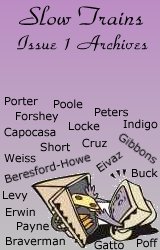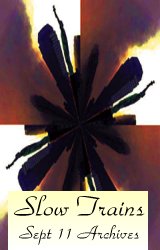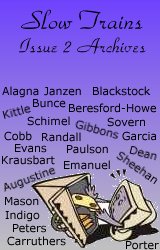I have seen Great Faith, and I deeply admire it. That may seem strange, since I'd be the first to confess that I don't have it. It's the work of a lifetime, I think, although it isn't measured by years, and isn't automatic at any age. Worse still, I'm certain that I can't entirely define Great Faith. Like Justice Potter Stewart's much parodied remarks about obscenity, I know Great Faith when I see it, and far more often, I know when what I'm seeing falls short of that mark. I know, for example, that flying airplanes into the side of buildings is not Great Faith.
We think of faith as immutably tied to religion, but that really isn't true. Certainly, religion and faith in a God or gods are fundamentally connected, to the extent that religion without that faith is hollow and absurd. But many parts of our lives, and especially our interactions with others, would be equally hollow without faith. Faith tells us that morning follows even the darkest night; faith tells us that the help we give a suffering fellow human is its own reward; faith tells us that living our lives makes a difference -- even if it's only a small difference. Without these, and countless other bits of faith we don't often consider, humans would vanish from the planet.
Faith is a construct, and each of us craft our own structure of faith from the world around us. But faith can also mislead. For many Americans, "attacks do not easily cross oceans" has been a matter of faith, even as we dutifully spoke of the "global village" and were periodically startled at how small the world had become.
 I went to visit the Fritz Chapel, a small monument to faith from a time when the world was much larger. It isn't a grand structure -- the fact is, your home may have larger closets -- but it has a beauty and sincerity that larger monuments sometimes lack. You aren't likely to stumble upon it by accident. It's north of Bellevue, Iowa, two miles off U.S. highway 51; two miles of winding, gravelled farm road off the highway, to be precise. I saw it again on an early fall day, a few trees just starting to turn, the sun working hard to boost the temperatures past jacket weather, the cows in the field across the valley faintly mourning the end of forever summer. It's a simple structure -- thick limestone walls open at one end, roof trusses carved of a single block of walnut, painted white picket fence about it. I didn't come to worship, but to reflect. But here's the thing that struck me, from the plaque beside it:
I went to visit the Fritz Chapel, a small monument to faith from a time when the world was much larger. It isn't a grand structure -- the fact is, your home may have larger closets -- but it has a beauty and sincerity that larger monuments sometimes lack. You aren't likely to stumble upon it by accident. It's north of Bellevue, Iowa, two miles off U.S. highway 51; two miles of winding, gravelled farm road off the highway, to be precise. I saw it again on an early fall day, a few trees just starting to turn, the sun working hard to boost the temperatures past jacket weather, the cows in the field across the valley faintly mourning the end of forever summer. It's a simple structure -- thick limestone walls open at one end, roof trusses carved of a single block of walnut, painted white picket fence about it. I didn't come to worship, but to reflect. But here's the thing that struck me, from the plaque beside it:
In the mid 1800's Mathias Fritz, his wife Marie Forrett and their 6 children left Luxembourg for the United States. Their ship completed the arduous passage in 42 days.
Imagine, 42 days in the cramped hold of a wooden ship powered only by the wind. 42 days. That's a journey of faith, indeed.
A frightening thing can happen when a part of our structure of faith is revealed as unsound -- we can perceive the whole structure as having crumbled. If attacks are possible here, perhaps everything we believe in -- everything we thought we were living for -- is meaningless. Perhaps, but I doubt that.
There is a characteristic of that Great Faith I'm so miserably unable to define, which I think applies here. Universally when I have seen it, persons of Great Faith lead what might be called examined lives. For them, faith is not a finished thing, a matter revealed and never again questioned; it is an everyday exercise, a structure stripped of sharp edges and flaws by constant, searching examination. For them, the tapestry unravelling cannot be a crisis, because the embellishment of the tapestry was never their faith. I do not think that all of us, or even most of us, can become persons of Great Faith, but we can all lead more examined lives, and the tragedy of September 11, and its aftermath, makes clear how important that is.
There is another thing that Great Faith is not; it is not the adrenaline rush of revelation. We also heavily associate revelation with religion -- the life-changing act of conversion, the thrill of ecstatic worship, Saul on the road to Damascus in the Christian Bible -- but like faith, revelation permeates our lives. It's the rush of a mystery solved, the satisfaction of a puzzle completed, the triumph of a concept grasped, that moment when after great struggle we realize, I know. It can be used for great good; without it, teaching would be nearly impossible. But it can also be used for great evil: enslaving the open-minded in cults, finding witches among friends and neighbors, fueling the Inquisition, driving the Crusades, using crowded passenger airplanes as weapons of mass destruction. And it is not Great Faith, but a cruel and deluded misdirection of faith.
I can't say if Mathias, or Marie, or their children, were persons of Great Faith, and I don't suppose it matters. Because their 42 day ocean journey, and Mathias' beautiful chapel, remind me that there is still a considerable lot that human faith can do.
©2001 by Brian Peters
Brian lives
precariously between a river and the great midwestern
prairie on the low-rent side of a limestone bluff.







